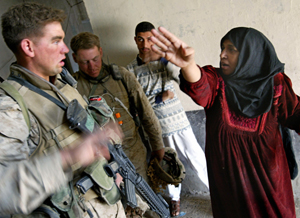|
Popular Uprising
|
 |
|
An Iraqi woman confronts U.S. marines as they raided homes in Fallujah on April 11. |
One year after President Bush declared victory in Iraq, the fury of war has once again exploded across Iraq. In the worst crisis yet for the U.S. occupation, rebellion has spread throughout Iraqi society.
As the U.S. moved to regain control, its policy of "collective punishment" left more than 800 Iraqis dead, many of them women and children. The Associated Press reports that two soccer fields in Fallujah have been turned into mass graveyards. More than U.S. soldiers were killed.
Outrage spread like wildfire and even members of the U.S.'s handpicked Governing Council resigned in protest. British leaders denounced U.S. tactics. For the first time polls showed that a majority of the U.S. public disapprove of Bush's Iraq policies.
Washington scrambled to downplay the disaster. Donald Rumsfeld said the fighting was the work of "thugs, gangs and terrorists" and not a popular uprising. The White House portrayed the Sunni insurgency as limited to former leaders of Saddam Hussein's Baath Party and the Shiite rebellion as largely the work of Moktada al-Sadr.
But The New York Times reports that U.S. intelligence officials believe that "hatred of the American occupation has spread rapidly among Shiites, and is now so large that al-Sadr and his forces represent just one element. They also believe that the Sunni rebellion goes far beyond former Baathist government members."
Robert Baer, a former CIA official who worked covertly in Iraq in the mid-1990s, said, "Sunni tribal leaders, formerly allied with the U.S., have turned against the United States and are helping to lead the Sunni rebellion."
Indeed, back on Sept. 17, 2003, a Defense Department intelligence report informed the White House that, "the U.S. main foe in Iraq may be ordinary Iraqis who are increasingly hostile to the occupation, not terrorists or Saddam Hussein." Now that hostility has broken into open rebellion. The U.S. has lost the hearts and minds of Iraqis.
As its June 30 deadline for the "transfer of sovereignty" approaches, the proposed recipient of that authority--the U.S.-appointed Iraqi Governing Council--is falling apart. Several members have quit in protest of U.S. violence and numerous others are reported to have fled the country in fear of retaliation for collaborating with the U.S. The political fabric of the occupation is coming undone.
"Six months of work is completely gone,'' a State Department official in Iraq told The New York Times. "There is nothing to show for it.'' Senator Ted Kennedy said, "Iraq is George Bush's Vietnam."
"The hope of the Bush administration to have even a symbolic transition looks remote, especially because they won't have anybody to whom to transfer sovereignty," said Marina Ottaway of the Carnegie Endowment for International Peace.
Chief U.S. administrator Paul Bremer admitted to NBC that the disintegration of the Council is "an important part of the ongoing crisis we have here now."
Although the U.S. occupation is in disarray, the White House shows no signs of preparing to pullout. Its thirst for oil and power in Iraq and the Middle East is too vast.
Still, Iraqi resistance to the occupation has reached a new level. With worldwide opposition to Bush's Iraq adventure, it serves as a powerful check on the plans for the many military ventures that the president so boldly forecast just a year or two ago.
Bob Wing is managing editor of War Times.
| Month in Review |
|---|
|
August 2010: |
| PAST articles |
Detoit: I Do Mind Empire (USSF Recap) “Bring the War (English) Time for Rebirth: (English) War Weariness, Military Heft, and (English) The Global Military Industrial Complex (English) A Stalled (English) Bush's Iraq “Surge”: Mission Accomplished? Iran: Let's Start with Some Facts Nuclear Weapons Forever (English) Time to End the Occupation of Iraq First-Hand Report from the Middle East (English) Haditha is Arabic (English) A Movement to End Militarism From Soldier to Students Not Soldiers Israel's "Disengagement" U.S. Soldiers Torture: Help Stop Torture — Be All You Can Be: OCTOBER 2006
|
|
War Times/Tiempo de Guerras is a fiscally sponsored project of the |